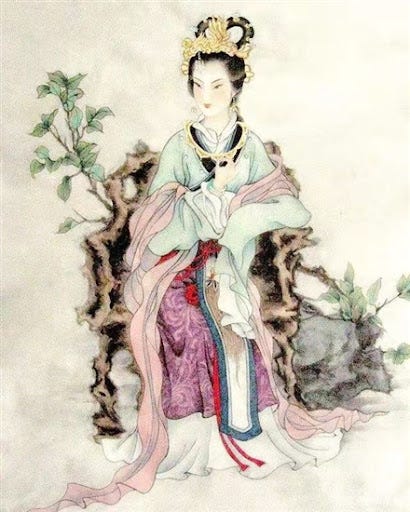Wang Xifeng The Victim
There’s a reason why I kept yesterday’s translation post short. Let’s take a deeper dive.
First of all, it’s clear from the context that Jia Lian and Wang Xifeng were engaging in daytime sexual activity. This is heavily implied, though it’s not directly stated:
奶子笑著,撇著嘴,搖頭兒。正問著,只聽那邊微有笑聲兒,卻是賈璉的聲音。接著房門響,平兒拿著大銅盆出來叫人舀水。
The wet nurse pursed her lips downward and shook her head.
As Zhou Rui’s wife was asking this, she could hear the faint sound of Jia Lian laughing from the other room. There was then the sound of a door opening, and Ping’er came in carrying a large copper basin, calling for someone to fetch water.
I presume that Ping’er asked for water to help Wang Xifeng with sanitation. Of course, the odd thing is that she’d make this request in what appears to be the middle of the day.
Presumably, this is why her daughter’s wet nurse was pursing her lips downward in disapproval (which is what 撇嘴 means) and shaking her head. I suppose you can assume that the wet nurse naturally disapproved of sexual intercourse during broad daylight, even if it did happen between a married couple.
But there’s more to this story than meets the eye.
This small segment introduces Wang Xifeng’s daughter, who hasn’t been mentioned at all to this point:
周瑞家的會意,忙著躡手躡腳兒的往東邊屋裡來,只見奶子拍著大姐兒睡覺呢。
Zhou Rui’s wife understood right away, and tiptoed over to the eastern room. Inside she saw a wet nurse putting Wang Xifeng’s daughter to sleep.
I was confused by the word 大姐兒 (big older sister) at first, and assumed that this referred to Wang Xifeng. It seems that 大姐兒 actually refers to the fact that this baby is the first girl born in her generation in the Jia family, and indicates that the baby has not yet been given a name.
You can infer from that fact that the baby is almost certainly very young - perhaps less than 100 days old. And that only adds to the problem with what Jia Lian did.
Now, it’s clear that Wang Xifeng gave birth at least some time ago. It’s common in China to this day for a woman to undergo confinement (i.e. 坐月子) for around 30 days after giving birth. Wang Xifeng has been mobile and has been actively leading the family since we first met her in chapter 3, which indicates that she’s already gone past that 30 day period.
However, because her daughter still has no name, it’s likely that the baby is under 100 days old. There’s also the fact that sexual activity with Jia Lian clearly rendered Wang Xifeng exhausted, so much so that she needs to be attended to in the middle of the day.
All of this brings up questions about the sexual politics of the Jia family.
Jia Lian is anything but a devout husband and father. Like the other men in the Jia household, Jia Lian largely ignores his familial responsibilities, leaving the tasks of managing the household finances and solving problems to the women. Instead, Jia Lian prefers to go out womanizing, which is something that we’ll see develop as the book goes along.
Despite the immense power she wields in the household, Wang Xifeng is clearly in a subservient role within her own marriage. Though there were almost certainly questions of her body’s ability to rest and recuperate after giving birth so recently, she winds up having to cater to Jia Lian’s whims anyway - and in broad daylight, no less!
In fact, you could read Wang Xifeng’s aggressive and somewhat callous leadership style as a direct reflection of how powerless she is in her own relationship. Wang Xifeng clearly cannot control her husband or prevent him from taking advantage of her. In fact, she also seems to have been unable to prevent him from taking her maid Ping’er as a concubine, which is implied by the term “心腹通房” used in this part of chapter 6:
The 通房 part of 心腹通房 implies that Ping’er is actually a concubine of Jia Lian, not merely a senior maid.
Anyway, there’s an interesting psychological insight here. Wang Xifeng might not naturally have been Wang Xifeng. Instead, there’s a chance that the circumstances she was forced to live in caused her to become Wang Xifeng. Like so many other characters in Dream of the Red Chamber, she seems to be a tragic story of a society gone wrong.
This dichotomy is pretty strongly implied in the predictive poems about Wang Xifeng in chapter 5. First comes the shorter poem:
凡鳥偏從末世來
都知愛慕此生才
一從二令三人木
哭向金陵事更哀
Disguised as a common bird, a phoenix emerges in this decadent age.
Everybody admires and envies her natural talents.
First she complies, then she commands, and then she’s cast aside.
Weeping, she turns towards Jinling, where her sorrow grows deeper.
Note that the word “phoenix” is written as 鳳 in Chinese; the word “凡鳥” (common bird) contains the two separate elements of the character 鳳. 鳳 is also part of Wang Xifeng’s given name (王熙鳳).
But the important part here is 一從二令三人木, which demonstrates both Wang Xifeng’s natural leadership tendencies (令) as well as her helpless subservience (從).



